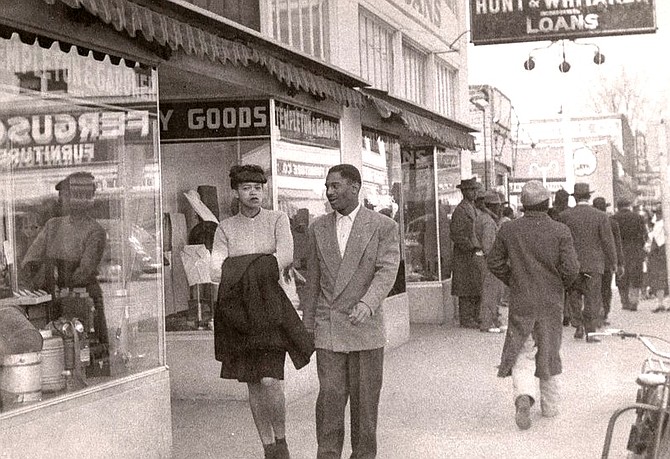Playwright Carole Cannon's "The Women of Farish Street" revisits some of Jackson's strongest female historical figures on Friday, Nov. 7 and Saturday, Nov. 8.
There may not be a singular image that comes to mind when people think of Farish Street, but the thought is rarely positive. Barred doors and empty businesses are notable features in most images of the once prominent African American business district. But playwright Carole Cannon wants to change that image, and it starts with "The Women of Farish Street," a one-woman show starring actress Jasmine Rivera, at Jackson State University's F.D. Hall Music Center, Friday, Nov. 7 and Saturday, Nov. 8.
"The Women of Farish Street" took several forms before Rivera took the stage. Cannon originally pitched the idea as a book to South Carolina-based publisher The History Press.
"They liked the idea, but I didn't like the contract," Cannon says. She decided not to sign the deal, but also didn't want to leave the concept behind. "I was doing research at the Margaret Walker Center and reading oral histories of all these remarkable women, and I said, 'If they could do ... this back then, I can self-publish a book now.'"
Cannon decided that bringing these powerful women to life required some help from the living. She used her research to write a play that would show audiences interesting aspects from Farish Street's past and act as an appetizer for the upcoming book. Her idea would have to be tweaked yet again, though.
"I had about 20 women I wanted in the show, and I tried to find three different actresses to play them," she says. "They all had issues, and a couple had to drop out along the way. It was just too much for one actress, and I had to cut some."
Thankfully, Cannon's "one actress" is Rivera, and Farish Street's famous tenants are in safe hands. Rivera, a Jackson State University graduate and former intern of New Stage Theatre, was drawn to the play's portrayal of strong, ambitious black women. Some might be wary of a single actress tasked with 10 characters, but Cannon's research helped Rivera bring individuality to each role.
"When I looked at the oral histories ... some of them had 40 or 50 pages, so you could get a better picture of the way they speak, the way they dress, if they were more conservative or whatever," Cannon says.
Of course, as with all things historic, evidence isn't always as easy as cracking a book. In those cases, Cannon had to delve into her own imagination with some of the characters, including Eliza Farish Pillars. "The patron saint of black nurses," as Cannon says, is a well-known figure around the nation, with multiple nurses associations named after her, but Cannon didn't realize Pillars' deep connection to Jackson until her research revealed the nurse's maiden name. Beyond that discovery, information on Pillars was limited.
"I couldn't find any articles about her. There certainly should have been some, but I couldn't find any," Cannon says. "All I had to go on was her niece's oral history. I read what I could find out about her, and I sort of added things to her piece just to flesh it out."
While creativity is a great tool within the setting of theater, it isn't quite as helpful when it comes to writing a factual study of a significant piece of Mississippi's African-American culture. Cannon had to determine where to draw the line.
"In the play, I can be a little more imaginative," she says. "If I find more information for the book, then I'll use it, but the book has got to be nonfiction, where as there are fictional elements of the show. I'm a journalist. I'm not really interested in writing a history book that's just going to sit on a shelf. I want it to be a very lively book that people actually want to read."
"The Women of Farish Street" has attracted many viewers, each with a different story to tell of his or her connection to the Jackson neighborhood, but a number of special guests will be in attendance at the remaining shows. On Friday, vocalist Marie Johnson will appear for a one-night-only performance as famed coloratura soprano Marie Selika, the first black singer to perform at the White House.
Cannon says the ultimate goal of "The Women of Farish Street" is to bring attention to the history of the area, something that's largely been forgotten due to its current state.
"I think that when people walk down Farish Street, especially younger people, ... they don't have a clue about the importance," Cannonn says. "It looks like some bombed-out street you could find in any city. But it was one of the first black business districts, and it was a place for black folks to be somebody."
Her vision for Farish's future is a return to its original intent: to offer a place where people can celebrate black businesses and artistic culture. It doesn't have to succumb to the tourist traps of Beale Street to be successful. It was once the place to grab a great meal, to catch a concert and to see local art, and it can be again.
"The Women of Farish Street" is at 7 p.m. Friday, Nov. 7 and 3 p.m. Saturday, Nov. 8 at the F.D. Hall Music Center at Jackson State University (1400 John R. Lynch St.). Advance tickets are $20 for general admission ($22.50 at the door) and $10 for students and seniors ($12.50 at the door). For more information, call 601-421-7517 or email farishstreetwomen@gmail.com.



Comments
Use the comment form below to begin a discussion about this content.